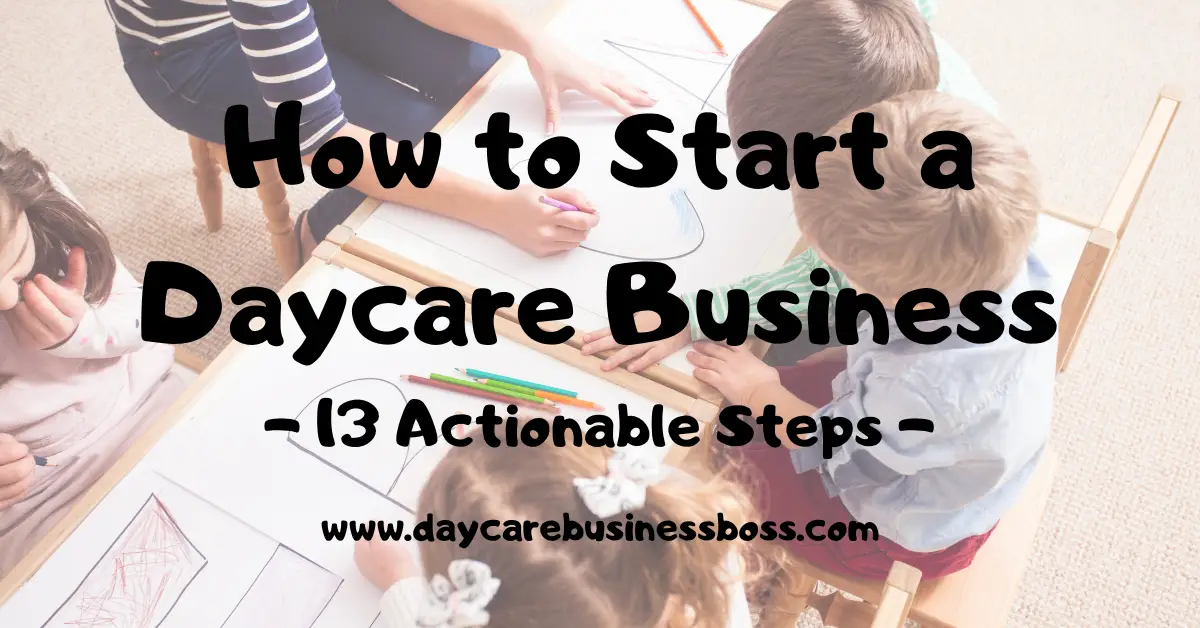In the United States, the childcare market is a highly lucrative industry it is one of the fastest-growing sectors in the country. According to recent reports, the U.S. child care market size was valued at $54.3 billion and is expected to increase at a compound annual growth rate (CAGR) of 3.9% from 2020 to 2027.
Hence, if you are looking to start a daycare business, there is no better time than the present!
But, before you commit, you should know that establishing a business is no easy task. Daycare businesses are uniquely complex and present a set of advantages (i.e., limited startup costs, minimal education requirements, tax breaks/exemptions, and high emotional and personal rewards) and disadvantages (i.e., stringent laws, great responsibility, long hours.)
Nonetheless, if you’ve done your research and are still determined to start a daycare business… Then continue reading as this article will give you valuable insight!
Starting a daycare center is a complex process. But, it is also gratifying and 100% doable if you follow these thirteen detailed steps:
-
- Determine your business structure
- Draft a business plan
- Secure the necessary funding
- Find the perfect location
- Obtain all legal permits and licenses
- Comply with all health and safety regulations
- Acquire the mandatory insurance policies
- Hire the right team
- Stock up on Supplies
- Invest in marketing
- Write up your daycare contract & policies
- Provide top-quality care and experience
- Keep an eye on the business’ finances
Below, we will go over each of the above mention steps for better understanding:
1. Determine your business structure
From a legal standpoint, there are several different ways to structure your daycare business. Thus, the first
step towards opening your childcare facility is to determine if you want to set up a non-profit or a for-profit entity.
Non-profit childcare centers might not be as lucrative as for-profit daycares. But, they come with a significant advantage: tax exemptions. As a rule of thumb, non-profit organizations do not pay federal or State tax income taxes.
Nonetheless, if you ARE more interested in making your daycare center a lucrative business and choose to establish a for-profit business, you have five different options:
-
- Sole Proprietorship
- General Partnership
- Limited Liability Company (LLC)
- S Corporation
- C Corporation
Most small businesses, including childcare centers, often choose to incorporate an LLC. Setting up an LLC comes with many advantages such as:
• It protects you (as the owner) from personal liabilities
• It entails a more straightforward and quicker process
• It does not require a board of directors, shareholder meetings, or other managerial formalities.
• It offers tax-treatment flexibility
Once you decide on what kind of company best fits your profile, you can take care of other formalities such as: registering your business with the Secretary of State’s office, a Business Bureau, or a Business Agency, opening a business account, and enrolling for taxes.
2. Draft a business plan
If you want your daycare center to succeed, having a clear and detailed business plan to act as the roadmap for the first 1-3 years of your business is vital.
 A business plan must include the actions and tactics that will help you reach your short-term goals, such as:
A business plan must include the actions and tactics that will help you reach your short-term goals, such as:
• Business Overview — including business model, legal structure, location, and target audience.
• Market/Competition analysis — describing your direct and indirect competitors as well as an overview of the childcare industry as a whole
• Budget Planning & Financial Predictions — a section that is especially important if you are planning on seeking funding for your daycare.
• Operations Plan — describing how the business will function, the physical setup, tasks, and more.
• Marketing/Sales Tactics — explaining how, when, and where you will advertise your center.
Remember that a business plan is not a document you draft at the beginning of your entrepreneurial journey and then forget. Regularly reviewing your plan can help you understand your strengths and weaknesses and allow you to make the necessary changes to continue growing as a fruitful business.
3. Secure the necessary funding
Depending on the scope, the seed capital required for a daycare ranges between $10,000 to $50,000. For a better grasp of what is needed, below a sample budget breakdown:
• Legalities (including licenses and permits) $800 – $3,000
• Insurance Policies $2,800 – $6,100*
• Certifications (e.g., First Aid, CPR, AED) $75 – $265 bi-yearly per person
• Supplies (e.g., safety, cleaning/sanitizing, art, toys, nap-time, eating time supplies) $900 – $1,800
• Marketing $400 – $5,900**
*It varies greatly depending on the number of employees and number of children under your care:
** Highly depends on the mediums and frequency with which you want to advertise:
Please keep in mind that there are various other expenses, including building renovations, payroll, utilities, software, and additional administrative costs to consider.
As you can see, childcare centers can represent a hefty investment. Fortunately, there are plenty of ways and methods available for you to secure the seed capital needed to open a daycare center, such as:
– Applying for a Government or Institutional Grant
– Requesting a business loan at a local bank or business credit card
– Obtaining a Small Business Association (SBA) Loan
– Securing angel investors
– Finding a capitalist partner
– Starting a crowd-funding or crowd-sourcing campaign
4. Find the perfect location
If you plan to open a daycare business somewhere other than your home, the next step will be finding the right location for your daycare center. As you may know, there are stringent laws appointed by regional and  federal authorities, departments (i.e., the fire department, the health department), and other institutions related to child safety and childcare.
federal authorities, departments (i.e., the fire department, the health department), and other institutions related to child safety and childcare.
You must be very cautious when selecting a location for your daycare business. Thus, before you start your search, consider the following:
-
- Home-based daycare centers have less stringent laws than childcare facilities operating from commercial sites.
- You will need to check your city/state zoning laws and child care guidelines to ensure the location you want is compliant.
- Your location will likely need to undergo specific alterations to comply with daycare requirements.
- Plus, it is essential that when choosing the right place to set up your business, you take into account two key factors: your target audience and your competition.
5. Obtain all legal permits and licenses
Now that you have found the perfect place, you can move on to securing all the necessary legal permits and licenses.
The legalities you need to comply with to open (and legally operate your center) will vary depending on the city you choose. In other words, each State has a particular child services department that oversees and enforces childcare laws.
Nevertheless, without a doubt, you will be required to solicit a “Childcare License” to operate your daycare legally. Much like having a valid driver’s license implies that you can drive a motorcycle, a car, or a truck; having a Childcare License shows that you have the skills and knowledge needed to take care of children.
Depending on your business model, you will need a Family Child Care Home License (designed for daycares based on a home) or a Child Care Center License (designed for daycares that operate from a commercial facility.)
Furthermore, all teachers, assistants, and caregivers working in your daycare center might be required to pass different childcare training courses successfully. These training courses are usually administered by specialized institutions such as the American Red Cross, Newborn Care Specialist Association (NCSA), YMCA, and more.
For more information about the regulations and requisites by State, you can visit the National Database of Child Care Licensing Regulations. This website includes contact information and relevant links for state licensing departments.
6. Comply with all health and safety regulations
In the United States, laws related to the safety and well-being of infants and children are taken very seriously. Therefore, childcare safety regulations across the nation are very stringent and often include:
-
- Criminal record clearances
- Fire safety clearances
- Training requirements for caregivers and staff
- Staff-to-children rations
- Disaster evacuation planning
- Foodservice handling permits
- Minimum required outdoor space
- Building fixtures and equipment clearances
Certain cities or States might also require that everyone who works at your daycare center need to be certified in:
• First Aid
• Cardiopulmonary Resuscitation (CPR)
• Automated External Defibrillator (AED)
Plus, they might also be required to undergo training in other health and safety issues such as:
• Child abuse and neglect prevention and reporting
• Prevention of the spread of infectious diseases
• Care of sick children
• Fire safety
• And more
Lastly, know there is a specific ratio of children: staff that you must comply with depending on the ages and number of children you plan to care for and that relevant authorities might administer periodic inspections to your location and interview staff to warrant children’s welfare and safety.
7. Acquire the mandatory insurance policies
The extensive list of legal compliances ends once you secure the necessary insurance policies. The most common insurance policies include General Liability coverage, Property Insurance, Worker’s Compensation Insurance, and Commercial Auto Insurance.
Nonetheless, when it comes to handling children, you can never be too careful. Hence, it is also heavily advised to acquire Liability insurance and Abuse and Molestation coverage.
If you are unsure what policies are best suited for your daycare business or specifically required in your city or town, hire a professional or specialist to walk you through the process.
8. Hire the right team
By the time you get to this step, you already have a clear picture of most of the requirements for childcare  workers. Nonetheless, who you hire as part of your team, is one of the most important decisions you will make as a daycare owner.
workers. Nonetheless, who you hire as part of your team, is one of the most important decisions you will make as a daycare owner.
Overall, there are general requisites that will act as the first “filter” when selecting candidates to join your team, such as being at least 18 years of age, being able to work legally in the United States, having no criminal record, and having good physical health.
If an individual passes these first “filters,” you can move on to other more specific skills and qualifications, including:
• Education
Education and training requirements for childcare workers vary by setting and State. Nonetheless, according to the U.S. Bureau of Labor Statistics, having a degree such as an Associate’s or Bachelor’s Degree in child development, childhood education, or educational psychology can be very favorable.
Plus, keep in mind that the more qualified your staff is, the more appealing your center will appear to parents and future clients.
• Personal Traits
Personal traits are another thing to consider when interviewing and vetting childcare workers. As a rule of thumb, you should hire individuals who have:
– Great interpersonal skills
– Excellent communicational abilities
– A mature and positive personality
– Good problem-solving strategies
– A professional presence and appearance
– Great physical Stamina
Additionally, it would be best always to hire individuals who are sensitive and accepting of different cultures, races, and religions.
• References & Previous Experience
Even if you are hiring staff for jobs that do not require direct interaction with children, you should always ask for references — either personal or professional references.
Further insight into who the person is, their background, and previous experience can help you make a more educated decision as to whether or not you should invite a specific person to be a part of your team.
Remember, childcare hiring decisions are one of the most crucial decisions you’ll have to make when operating a daycare business.
9. Stock up on Supplies
It might seem like a no-brainer, but you cannot open a daycare center without properly stocking up on supplies ranging from toys and art kits to safety and cleaning products.
Below a categorized list of the basic supplies you will need for your daycare:
1. Furniture
– Desks
– Chairs
– White/Blackboards
– Tables
– Cupboards
– Lamps
– Lockers/cubbies
2. Safety:
– First Aid Kit
– Smoke Detectors
– Fire Extinguisher
– Emergency lights
– Pediatric medications
3. Art Supplies/Toys
– Pencils
– Coloring books
– Markers
– Watercolors
– Tempera paints
– Scissors
– Glue
– Puzzles
– Books
– Legos
– Wooden blocks
– Board Games
– Play Dough
4. Cleaning & Sanitizing:
– Hand Sanitizer
– Hand Soap
– Wipes
– Toilette Paper
– Plastic bags
– Mops
– Brooms
– Vacuum cleaner
– Cleaning bucket
– Disinfectant
– Multi-purpose cleaner
– Bathroom cleaner
5. Nap-Time & Eating-Time
– Mats
– Blankets
– Pillows
– Plates
– Drinking Cups
– Baby Bottles
– Spoons/Forks
Note that supplies vary considerably based on the number of kids and staff members, the center’s structure (e.g., full-time, part-time, offers after-school activities), the ages of the children attending the daycare, and more.
10. Invest in marketing
Marketing is one of the last steps on your daycare construction journey. However, that does not mean that you should diminish its importance. You must follow the initial marketing program drafted on your business plan as the childcare industry is very competitive.
 It is always best to start small and local and make room for more complex and extensive campaigns down the road. For instance, begin by developing a strong and unique corporate identity (i.e., logo, tag line, a mission statement, a vision statement.)
It is always best to start small and local and make room for more complex and extensive campaigns down the road. For instance, begin by developing a strong and unique corporate identity (i.e., logo, tag line, a mission statement, a vision statement.)
Once your branding is on point, set up a website for your daycare center and create a profile on pertinent social media platforms, including Instagram, Linked In, and Facebook. You will also want to consider listing your daycare business in local childcare directories and enroll in school fairs within your community.
If your budget allows it, use online advertising to reach a wider audience by promoting your center on popular educational sites, parenting blogs, relevant groups, and more.
Once you’ve succeeded in filling your inaugural child roster, do no stop. You must continue your marketing efforts to develop a solid customer base and build a steady reputation.
The following steps are not necessarily a must-do. Nonetheless, they can go a long way in the initial phases of your daycare business and will make a difference down the line.
11. Write up your daycare contract & policies
To further protect your business from a legal standpoint, a lawyer o specialist should help you draw up a contract and a separate document that specifies your daycare center policies. Every new parent or client must review and sign these two documents before enlisting their kid(s).
The contract is a standard document stating that you will provide childcare in exchange for $XX amount of money and establish specific terms and conditions. Your policies, on the other hand, give parents/clients logistical and operational insights. Here, you outline protocol concerning vacation days, sick days, inclement weather, drop-off/pickup schedules, curriculum, additional activities, and more.
12. Provide top-quality care and experience
In the end, the success of your daycare business comes down to the quality of service you are providing. Meaning that if the children under your care and who attend your facility are appropriately taken care of, happy, and look forward to going to the center every day, your business will blossom.
Plus, you are more likely to attract more referrals and build a reputation within your community and within your town, city, or even on a State level.
Consequently, you should constantly be looking for ways to improve your daycare by keeping up to date with industry trends, analyzing your direct (and indirect) competitors, and finding new opportunities to expand; this applies to your staff, location, and curriculum.
13. Keep an eye on the business’ finances
As we mentioned before, a daycare center is a small business. And 1 in 9 small businesses fail due to poor management when it comes to finances.
Therefore, if you want to operate a successful childcare facility, you need to have a clear picture of your financial status every step of the way and learn to manage expenses.
Nonetheless, know that managing your business’ finances entails more than just tracking the amount of money that comes in vs. the amount of money that comes out. You need to learn to make informed decisions and educated guesses on fund allocation, marketing tactics, and more. And by all means, this does not mean that you should be responsible for every administrative aspect of your business. You should be able to hire competent personnel to help you run your daycare center. After all, starting a daycare business is no easy task!
Wrapping it up!
Opening your childcare center means you become not only a childcare provider but also a small-business owner. Thus, there are many things to take care of to ensure the daycare center runs smoothly, generates profits, complies with every single law and regulation, offers a top-quality service, and has room to grow and innovate.
In consequence, opening a daycare business is not a decision to take lightly. You will need to be truly committed and be willing to make sacrifices, put in the time, effort, and money.
Nonetheless, do not get discouraged! Owning a daycare center is also a very rewarding venture — from a financial, personal, and professional standpoint!
Check out our finance tips HERE.
Related Questions
1. What are the legal implications associated with owning a daycare center?
Running a daycare center demands much more than being careful with children. As a daycare owner, you will need to obey specific laws related to childcare and dictated not only by your State but also by federal authorities.
In the United States, legal implications heavily depend on the State and the circumstances. As a result, legal implications can range from a standard penalty, sanction, or warning to serious lawsuits or even imprisonment or detention.
2. Are daycare centers profitable?
Based on the Economic Policy Institute, in the United States, parents with children under the age of five spend a total of $42 billion for early child care and education, including preschool programs and daycares.
So, in short, yes! Daycare centers can be very profitable businesses. Depending on location, size, and demand, daycare center owners can expect to make between $25,000 – $75,000 a year in net profits.

Please note: This blog post is for educational purposes only and does not constitute legal advice. Please consult a legal expert to address your specific needs.
To learn more on how to start your own daycare checkout my startup course and documents here.

Meet Shawn Chun: Entrepreneur and Childcare Business Fan.
I’m a happy individual who happens to be an entrepreneur. I have owned several types of businesses in my life from a coffee shop to an import and export business to an online review business plus a few more and now I create online daycare business resources for those interested in starting new ventures. It’s demanding work but I love it. I do it for those passionate about their business and their goals. That’s why when I meet a childcare business owner, I see myself. I know how hard the struggle is to retain clients, find good employees and keep the business growing all while trying to stay competitive.
That’s why I created Daycare Business Boss: I want to help childcare business owners like you build a thriving business that brings you endless joy and supports your ideal lifestyle.

